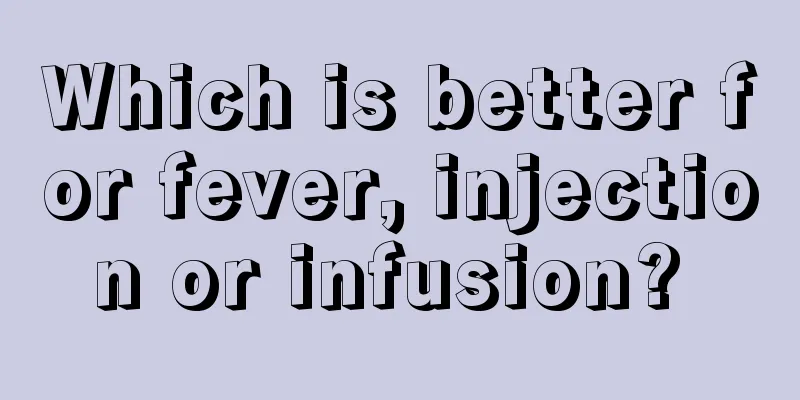Which is better for fever, injection or infusion?

|
Fever is the most common symptom in life and can cause serious damage to people's bodies. This is because fever is a phenomenon in which the body's internal defense mechanism is activated, which will consume most of the body's vitality. Severe fever can damage the brain and cause irreversible damage. There are many treatments for fever, among which injections and infusions are the most common. Let’s take a look at which is better for fever: injections or infusions? Fever is just a symptom. Whether to get an injection, infusion, or take medicine depends on what disease causes the fever. Generally, if you want to reduce fever simply, you need to take some antipyretics. The commonly used ones in clinical practice now are acetaminophen or ibuprofen. Before a clear diagnosis is made, do not blindly give infusions or injections. Even hospitals with benign diseases will not give infusions to patients casually. People have regarded intravenous infusion as the most effective treatment method and choose infusion for both major and minor illnesses. In fact, inappropriate infusion can lead to very serious consequences and even be life-threatening. Even for common colds, fevers, and diarrhea, many people ask doctors to give them intravenous infusions, believing that infusions can quickly improve their conditions and treating intravenous infusions as an omnipotent "life-saving straw." Many people now have misunderstandings about intravenous infusion. Many patients often say that intravenous infusion can increase the body's absorption rate of drugs, so the disease will heal faster. Now most patients who go to the hospital for treatment ask the doctor to give them intravenous infusion, believing that only intravenous infusion can make the disease heal faster. The harm of excessive infusion is quite serious. Generally, it can be treated with medication or intramuscular injection. Most people may have the same understanding of infusion as Ms. Wu. This is due to a lack of medical knowledge and is also a misunderstanding of most people. It is undeniable that the intravenous infusion method reduces the damage of gastric acid to drugs and has a more direct effect, especially for patients with stomach problems and high fever. However, intravenous infusion does not cure the disease as some people imagine. On the contrary, intravenous infusion has greater risks than oral medication. Because infusion requires sterile operation, especially intravenous infusion, the environment must be clean, otherwise the bacteria and pathogenic microorganisms in the atmosphere will contaminate the puncture site and the infused fluid, causing adverse reactions in the patient. |
<<: How to use Platycladus orientalis leaves to treat seborrheic alopecia
>>: Treatment methods for severe mental disorders
Recommend
Can I just ignore the cervical fistula?
The neck is a very important part of the human bo...
What are the treatments for primary lung cancer? What are the complications of primary lung cancer?
What are the treatments for lung cancer? Although...
What to eat to stay awake when you feel sleepy
Busy work and life make many people exhausted, an...
The process of bloody metastasis of endometrial cancer
Endometrial cancer metastasis, compared with beni...
How do we identify prostate cancer?
Because prostate cancer occurs in many stages, ma...
How to treat a burning sensation in the body
In daily life, many reasons can cause some proble...
Colon cancer recurrence cure rate
Is the cure rate of colon cancer high? If colon c...
What are the nursing measures for throat cancer?
If you want to recover completely as soon as poss...
What are the precautions for hyaluronic acid dissolving enzyme
The effects of hyaluronic acid dissolving enzyme ...
How to effectively treat thyroid nodules
Thyroid nodules are a relatively common disease, ...
How long should babies stop taking probiotics?
The gastrointestinal function of babies is relati...
What are the effects of placenta cream
After a woman gives birth, she will have a placen...
What to do if acne appears in the t-zone
The T-zone is a very important area on the human ...
How many tonsils are there
Although we often hear about tonsillitis in our d...
The harm of smoking to the skin and aggravation of skin diseases
Most men have the habit of smoking, and many wome...









